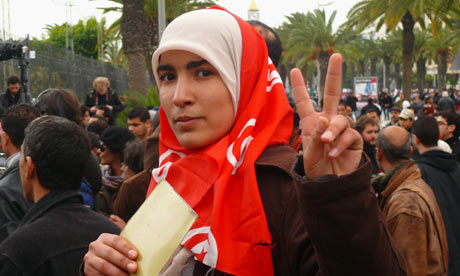Deposing dictators is just the start of a Middle East transformation
Protest won't fade away in Egypt and Tunisia, whatever the old order and its allies in the US think

Wherever you go around Tunis, you see people demonstrating – at the airport, in front of the post office, schools, ministries, factories: simply everywhere. Protests and pickets are a feature of daily life. People sit in cafes drinking and chatting alongside demonstrators shouting slogans for change. Even small children have turned into political analysts, and are overheard mocking the speeches of Ben Ali, the deposed dictator. I saw one demonstration quietly split in two to allow the tram to pass by, reassembling promptly after its departure. Tunisians seem to have stumbled on the magical power of street protest, and are unwilling to relinquish it.
After three decades of silence, self-censorship and repression there is an explosion of social demands from all sectors. Even police officers have been marching to request the forming of a union that defends their rights. Tunisia's new rulers are besieged by endless demands that they can neither meet nor openly reject. The French word dégage (get out) – initially used by the crowds that encircled the interior ministry on 14 January – is being used to brand this new era. It is brandished against all those associated with Ben Ali's rule – political figures, directors of state and private companies, senior civil servants, top security officials – generating a climate of perpetual tension and discontent in a society haunted by the prospect of a return to tyranny. The peaceful nature of this continuous protest movement has ensured that the country remains relatively stable in highly volatile circumstances.
Post-Ben Ali Tunisia is being shaped by two conflicting dynamics: change and containment. The first is the dynamic of the street – fuelled by the demands of the young and the unorganised opposition. The second stems from the political establishment, who have the state bureaucracy, security apparatus and money on their side. Present-day Tunisia is defined by these two polarised logics.
Shortly after Ben Ali's demise thousands of men and women outraged by the persistence of the old system travelled for hundreds of miles from the country's marginalised south and inner cities, some on foot, in what they described as a "freedom caravan". They surrounded the office of the prime minister, Mohamed Ghannouchi, in the capital's Kasbah district and staged an open-ended picket to demand the overthrow of the interim government, which they dismissed as a remnant of Ben Ali's dictatorship. With the world's attention on Cairo, their protest – which lasted for over a week – was brutally dispersed by the police, with many casualties. The public outcry that ensued compelled Mohamed Ghannouchi's administration to make a series of unwanted concession that began with the resignation of ministers belonging to Ben Ali's RCD party, culminating in the suspension of the party altogether.
Last week 25 governors were appointed, 19 of them RCD members – but most were forced from office by protests that flared up in towns around the republic (including Gafsa and Gabelli in the south and Nabeul and Sousse in the north). A few days ago, parliament was hurriedly convened to grant the interim president – who had served under both Ben Ali and his predecessor – authority to issue edicts without consulting the legislative authority. Such moves have fuelled calls for the dissolution of the government and its replacement by a founding council to oversee the transition to democracy. This clash between a wounded old regime fighting for survival and a new order being formed painfully and arduously under popular pressure is the story of Tunisia today.
These developments serve as important indicators of what could lie ahead for Egypt, its heavyweight Arab sister, now that Mubarak has gone. The containment policy that has been pursued in Tunis is already under way in Cairo. There is a stubborn will, internal and external, to salvage a system that has failed to preserve its figurehead. That is precisely what Barack Obama means by "managed change", and what Cameron intends by "orderly transition". The US is seeking to avert the mistakes of 1979 – when it positioned itself in open confrontation with the Iranian masses – by using unusually reserved, non-provocative language. But beyond the rhetoric, its strategy consists in emptying change of its essence and confining it instead to a rearrangement of the existing power centres.
Reality may, however, turn out to be too complex for this strategy to succeed. The US could find itself powerless to control the rhythm and direction of events on the ground. Just as Tunisia's protest movement did not end with the ousting of Ben Ali, the millions who have filled Tahrir Square for over two weeks are unlikely to consider their mission accomplished with Mubarak's departure. The forces unleashed by revolution will not fade into the background overnight – but are set to occupy the centre stage of politics in Egypt, as in Tunisia, for the foreseeable future.
The attempt to contain events in these countries hinges on the hope that they are simply transient waves of anger that will recede with the passing of Ben Ali or Mubarak. The truth, however, is that what is under way are revolutions originating from society's depths: political earthquakes that will transform the entire region. What we are witnessing is nothing short of the birth of the new Middle East.

